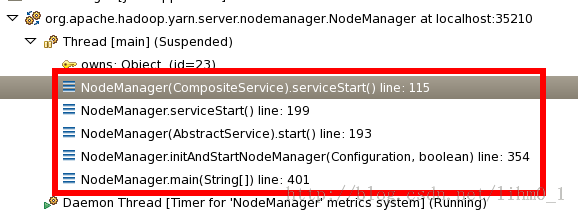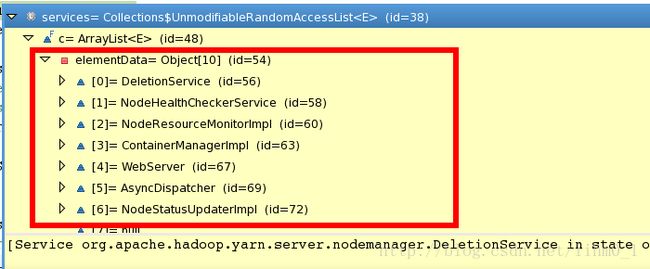Hadoop2.x NodeManager启动之服务启动
在NM各服务初始化完毕之后,会进入启动阶段,该阶段的调用栈如下

由于NM也是一个综合服务类,所以他会进入CompositeService的serviceStart循环启动各个服务,代码如下:

NodeHealthCheckerService服务:综合服务类内部包含LocalDirsHandlerService服务,该功能是否开启受yarn.nodemanager.disk-health-checker.enable控制默认开启,默认2分钟检测一次,检测目录为yarn.nodemanager.local-dirs yarn.nodemanager.log-dirs ,默认每2分钟检测一次

由于NM也是一个综合服务类,所以他会进入CompositeService的serviceStart循环启动各个服务,代码如下:
protected void serviceStart() throws Exception {
//获得服务列表
List<Service> services = getServices();
if (LOG.isDebugEnabled()) {
LOG.debug(getName() + ": starting services, size=" + services.size());
}
for (Service service : services) {
// start the service. If this fails that service
// will be stopped and an exception raised
service.start();//启动相应服务
}
super.serviceStart();
}这段代码循环启动如下服务

NodeHealthCheckerService服务:综合服务类内部包含LocalDirsHandlerService服务,该功能是否开启受yarn.nodemanager.disk-health-checker.enable控制默认开启,默认2分钟检测一次,检测目录为yarn.nodemanager.local-dirs yarn.nodemanager.log-dirs ,默认每2分钟检测一次
//LocalDirsHandlerService.serviceStart() line: 154
@Override
protected void serviceStart() throws Exception {
if (isDiskHealthCheckerEnabled) {
dirsHandlerScheduler = new Timer("DiskHealthMonitor-Timer", true);
dirsHandlerScheduler.scheduleAtFixedRate(monitoringTimerTask,
diskHealthCheckInterval, diskHealthCheckInterval);
}
super.serviceStart();
} 目录检测类构建如下:
public MonitoringTimerTask(Configuration conf) throws YarnRuntimeException {
localDirs = new DirectoryCollection(
validatePaths(conf.getTrimmedStrings(YarnConfiguration.NM_LOCAL_DIRS)));
logDirs = new DirectoryCollection(
validatePaths(conf.getTrimmedStrings(YarnConfiguration.NM_LOG_DIRS)));
localDirsAllocator = new LocalDirAllocator(
YarnConfiguration.NM_LOCAL_DIRS);
logDirsAllocator = new LocalDirAllocator(YarnConfiguration.NM_LOG_DIRS);
}检测函数如下,因为是对文件系统的检测,无非是读写执行这些权限,所以这里就不继续贴下去了
private void checkDirs() {
boolean newFailure = false;
if (localDirs.checkDirs()) {
newFailure = true;
}
if (logDirs.checkDirs()) {
newFailure = true;
}
if (newFailure) {
updateDirsAfterFailure();
}
lastDisksCheckTime = System.currentTimeMillis();
}
ContainerManager服务:该服务会启动一个RPC服务器,协议为:ContainerManagementProtocol用于AM与NM之间的通信,handler线程数量由yarn.nodemanager.container-manager.thread-count控制@Override
protected void serviceStart() throws Exception {
// Enqueue user dirs in deletion context
Configuration conf = getConfig();
Configuration serverConf = new Configuration(conf);
// always enforce it to be token-based.
serverConf.set(
CommonConfigurationKeysPublic.HADOOP_SECURITY_AUTHENTICATION,
SaslRpcServer.AuthMethod.TOKEN.toString());
YarnRPC rpc = YarnRPC.create(conf);
InetSocketAddress initialAddress = conf.getSocketAddr(
YarnConfiguration.NM_ADDRESS,
YarnConfiguration.DEFAULT_NM_ADDRESS,
YarnConfiguration.DEFAULT_NM_PORT);
//创建RPC服务器,用于接收AM的控制,具体协议可参考ContainerManagementProtocol
server =
rpc.getServer(ContainerManagementProtocol.class, this, initialAddress,
serverConf, this.context.getNMTokenSecretManager(),
conf.getInt(YarnConfiguration.NM_CONTAINER_MGR_THREAD_COUNT,
YarnConfiguration.DEFAULT_NM_CONTAINER_MGR_THREAD_COUNT));
// Enable service authorization?
if (conf.getBoolean(
CommonConfigurationKeysPublic.HADOOP_SECURITY_AUTHORIZATION,
false)) {
refreshServiceAcls(conf, new NMPolicyProvider());
}
//服务器启动阶段不接受客户端的控制请求
LOG.info("Blocking new container-requests as container manager rpc" +
" server is still starting.");
this.setBlockNewContainerRequests(true);
server.start();
InetSocketAddress connectAddress = NetUtils.getConnectAddress(server);
NodeId nodeId = NodeId.newInstance(
connectAddress.getAddress().getCanonicalHostName(),
connectAddress.getPort());
((NodeManager.NMContext)context).setNodeId(nodeId);
this.context.getNMTokenSecretManager().setNodeId(nodeId);
this.context.getContainerTokenSecretManager().setNodeId(nodeId);
LOG.info("ContainerManager started at " + connectAddress);
super.serviceStart();
}
ContainerManager子服务之ResourceLocalizationService
@Override
public void serviceStart() throws Exception {
cacheCleanup.scheduleWithFixedDelay(new CacheCleanup(dispatcher),
cacheCleanupPeriod, cacheCleanupPeriod, TimeUnit.MILLISECONDS);
server = createServer();
server.start();
localizationServerAddress =
getConfig().updateConnectAddr(YarnConfiguration.NM_LOCALIZER_ADDRESS,
server.getListenerAddress());
LOG.info("Localizer started on port " + server.getPort());
super.serviceStart();
}
ContainerManager子服务之ContainersMonitor:
public void run() {
while (true) {
// Print the processTrees for debugging.
.....
// 添加新的容器
synchronized (containersToBeAdded) {
for (Entry<ContainerId, ProcessTreeInfo> entry : containersToBeAdded
.entrySet()) {
ContainerId containerId = entry.getKey();
ProcessTreeInfo processTreeInfo = entry.getValue();
LOG.info("Starting resource-monitoring for " + containerId);
trackingContainers.put(containerId, processTreeInfo);
}
containersToBeAdded.clear();
}
// 删除完成容器
synchronized (containersToBeRemoved) {
for (ContainerId containerId : containersToBeRemoved) {
trackingContainers.remove(containerId);
LOG.info("Stopping resource-monitoring for " + containerId);
}
containersToBeRemoved.clear();
}
// 检测所有已跟踪容器,如果资源使用超出限制则kill
long vmemStillInUsage = 0;
long pmemStillInUsage = 0;
//遍历容器
for (Iterator<Map.Entry<ContainerId, ProcessTreeInfo>> it =
trackingContainers.entrySet().iterator(); it.hasNext();) {
Map.Entry<ContainerId, ProcessTreeInfo> entry = it.next();
ContainerId containerId = entry.getKey();
ProcessTreeInfo ptInfo = entry.getValue();
try {
String pId = ptInfo.getPID();
// 如果PID为空则需要重新初始化
if (pId == null) {
// get pid from ContainerId
pId = containerExecutor.getProcessId(ptInfo.getContainerId());
if (pId != null) {
// pId will be null, either if the container is not spawned yet
// or if the container's pid is removed from ContainerExecutor
LOG.debug("Tracking ProcessTree " + pId
+ " for the first time");
ResourceCalculatorProcessTree pt =
ResourceCalculatorProcessTree.getResourceCalculatorProcessTree(pId, processTreeClass, conf);
ptInfo.setPid(pId);
ptInfo.setProcessTree(pt);
}
}
// End of initializing any uninitialized processTrees
//初始化后仍然为空的则放弃跟踪
if (pId == null) {
continue; // processTree cannot be tracked
}
LOG.debug("Constructing ProcessTree for : PID = " + pId
+ " ContainerId = " + containerId);
ResourceCalculatorProcessTree pTree = ptInfo.getProcessTree();
pTree.updateProcessTree(); // update process-tree
//计算当前内存使用:物理内存和虚拟内存
long currentVmemUsage = pTree.getCumulativeVmem();
long currentPmemUsage = pTree.getCumulativeRssmem();
// as processes begin with an age 1, we want to see if there
// are processes more than 1 iteration old.
long curMemUsageOfAgedProcesses = pTree.getCumulativeVmem(1);
long curRssMemUsageOfAgedProcesses = pTree.getCumulativeRssmem(1);
//计算阈值
long vmemLimit = ptInfo.getVmemLimit();
long pmemLimit = ptInfo.getPmemLimit();
LOG.info(String.format(
"Memory usage of ProcessTree %s for container-id %s: ",
pId, containerId.toString()) +
formatUsageString(currentVmemUsage, vmemLimit, currentPmemUsage, pmemLimit));
boolean isMemoryOverLimit = false;
String msg = "";
//判断内存使用是否超出阈值
if (isVmemCheckEnabled()
&& isProcessTreeOverLimit(containerId.toString(),
currentVmemUsage, curMemUsageOfAgedProcesses, vmemLimit)) {
// Container (the root process) is still alive and overflowing
// memory.
// Dump the process-tree and then clean it up.
msg = formatErrorMessage("virtual",
currentVmemUsage, vmemLimit,
currentPmemUsage, pmemLimit,
pId, containerId, pTree);
isMemoryOverLimit = true;
} else if (isPmemCheckEnabled()
&& isProcessTreeOverLimit(containerId.toString(),
currentPmemUsage, curRssMemUsageOfAgedProcesses,
pmemLimit)) {
// Container (the root process) is still alive and overflowing
// memory.
// Dump the process-tree and then clean it up.
msg = formatErrorMessage("physical",
currentVmemUsage, vmemLimit,
currentPmemUsage, pmemLimit,
pId, containerId, pTree);
isMemoryOverLimit = true;
}
//如果超出阈值,则杀死该容器
if (isMemoryOverLimit) {
// Virtual or physical memory over limit. Fail the container and
// remove
// the corresponding process tree
LOG.warn(msg);
// warn if not a leader
if (!pTree.checkPidPgrpidForMatch()) {
LOG.error("Killed container process with PID " + pId
+ " but it is not a process group leader.");
}
// kill the container
eventDispatcher.getEventHandler().handle(
new ContainerKillEvent(containerId, msg));
it.remove();
LOG.info("Removed ProcessTree with root " + pId);
} else {
// Accounting the total memory in usage for all containers that
// are still
// alive and within limits.
vmemStillInUsage += currentVmemUsage;
pmemStillInUsage += currentPmemUsage;
}
} catch (Exception e) {
// Log the exception and proceed to the next container.
LOG.warn("Uncaught exception in ContainerMemoryManager "
+ "while managing memory of " + containerId, e);
}
}
//休息一下
try {
Thread.sleep(monitoringInterval);
} catch (InterruptedException e) {
LOG.warn(ContainersMonitorImpl.class.getName()
+ " is interrupted. Exiting.");
break;
}
}
}
NodeStatusUpdater服务:接收来自RM命令,并执行相应操作,类似MR1中TT的主循环
protected void startStatusUpdater() {
statusUpdaterRunnable = new Runnable() {
@Override
@SuppressWarnings("unchecked")
public void run() {
int lastHeartBeatID = 0;
while (!isStopped) {
// Send heartbeat
try {
//执行心跳操作,并捕获返回结果
NodeHeartbeatResponse response = null;
NodeStatus nodeStatus =
getNodeStatusAndUpdateContainersInContext(lastHeartBeatID);
NodeHeartbeatRequest request =
NodeHeartbeatRequest.newInstance(nodeStatus,
NodeStatusUpdaterImpl.this.context
.getContainerTokenSecretManager().getCurrentKey(),
NodeStatusUpdaterImpl.this.context.getNMTokenSecretManager()
.getCurrentKey());
response = resourceTracker.nodeHeartbeat(request);
//get next heartbeat interval from response
nextHeartBeatInterval = response.getNextHeartBeatInterval();
updateMasterKeys(response);
//节点关闭操作
if (response.getNodeAction() == NodeAction.SHUTDOWN) {
LOG
.warn("Recieved SHUTDOWN signal from Resourcemanager as part of heartbeat,"
+ " hence shutting down.");
LOG.warn("Message from ResourceManager: "
+ response.getDiagnosticsMessage());
dispatcher.getEventHandler().handle(
new NodeManagerEvent(NodeManagerEventType.SHUTDOWN));
break;
}
//重新同步操作
if (response.getNodeAction() == NodeAction.RESYNC) {
LOG.warn("Node is out of sync with ResourceManager,"
+ " hence resyncing.");
LOG.warn("Message from ResourceManager: "
+ response.getDiagnosticsMessage());
// Invalidate the RMIdentifier while resync
NodeStatusUpdaterImpl.this.rmIdentifier =
ResourceManagerConstants.RM_INVALID_IDENTIFIER;
dispatcher.getEventHandler().handle(
new NodeManagerEvent(NodeManagerEventType.RESYNC));
break;
}
//清理相应容器
lastHeartBeatID = response.getResponseId();
List<ContainerId> containersToCleanup = response
.getContainersToCleanup();
if (!containersToCleanup.isEmpty()) {
dispatcher.getEventHandler().handle(
new CMgrCompletedContainersEvent(containersToCleanup,
CMgrCompletedContainersEvent.Reason.BY_RESOURCEMANAGER));
}
List<ApplicationId> appsToCleanup =
response.getApplicationsToCleanup();
//Only start tracking for keepAlive on FINISH_APP
trackAppsForKeepAlive(appsToCleanup);
if (!appsToCleanup.isEmpty()) {
dispatcher.getEventHandler().handle(
new CMgrCompletedAppsEvent(appsToCleanup,
CMgrCompletedAppsEvent.Reason.BY_RESOURCEMANAGER));
}
} catch (ConnectException e) {
//catch and throw the exception if tried MAX wait time to connect RM
dispatcher.getEventHandler().handle(
new NodeManagerEvent(NodeManagerEventType.SHUTDOWN));
throw new YarnRuntimeException(e);
} catch (Throwable e) {
// TODO Better error handling. Thread can die with the rest of the
// NM still running.
LOG.error("Caught exception in status-updater", e);
} finally {
synchronized (heartbeatMonitor) {
nextHeartBeatInterval = nextHeartBeatInterval <= 0 ?
YarnConfiguration.DEFAULT_RM_NM_HEARTBEAT_INTERVAL_MS :
nextHeartBeatInterval;
try {
heartbeatMonitor.wait(nextHeartBeatInterval);
} catch (InterruptedException e) {
// Do Nothing
}
}
}
}
}